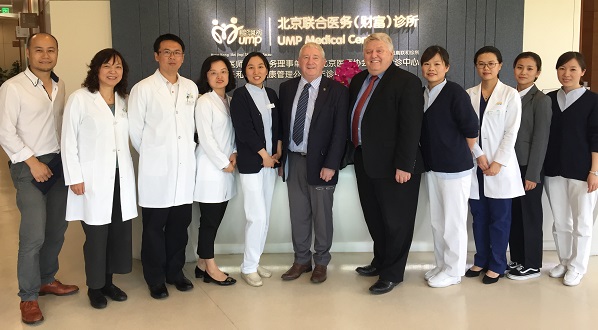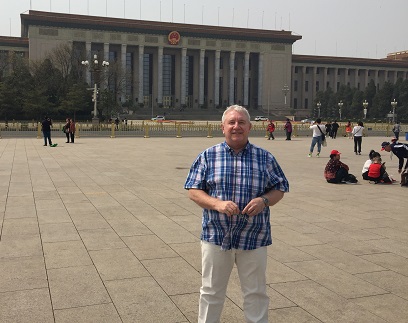From the CEO’s Desk: WONCA Standards and Accreditation
 Photo: Garth Manning and Rich Roberts with some of the staff of the Beijing Eaton Medical Centre. Dr Kenny Kung, UMP's Medical director, is on the left of the photo.
Photo: Garth Manning and Rich Roberts with some of the staff of the Beijing Eaton Medical Centre. Dr Kenny Kung, UMP's Medical director, is on the left of the photo.
As I write this I have just returned from China after a very interesting week, together with Professor Rich Roberts, where we were carrying out practice accreditation visits on eight clinics in Beijing and Shanghai.
Most of you will be aware that WONCA Council, at its 2013 meeting in Prague, endorsed the
WONCA Global Standards for Postgraduate Family Medicine Education Programmes
These global standards may be used in a variety of ways, always with the overall goal of quality improvement in Family Medicine Postgraduate Education, but including: self assessment and program quality improvement; new program development; and peer review; as well as more formal recognition and accreditation by WONCA.
WONCA’s Working Party on Education then went on to develop the
WONCA Global Standards for Continuing Professional Development (CPD) for Family Doctors which were presented to, and endorsed by, the 2016 WONCA Council:
Like the standards for medical education, these standards had several objectives in mind:
• To provide a resource for family doctors and/or groups of family doctors to design and structure a program of continuing professional development to reinforce lifelong learning.
• To optimize current CPD systems such that, through more effective program design and delivery, family doctors are advancing the profession and patient care.
• To offer a set of globally recognized standards developed through a family medicine perspective to provide feedback on existing CPD programs and systems and encourage international recognition of CPD activities.
Practice Accreditation
As a further addition to WONCA Standards, and to enhance quality standards and improvement in family medicine practice, the Secretariat developed a series of
Global Standards for Practice Accreditation, which Executive endorsed late in 2017. These standards look at four key areas of practice:
1.
Practitioners – assessing the qualifications, experience and training of the doctors, nurses and other health professional staff in the practice who are providing primary health care services.
2.
Patients – ensuring that the patients in the practice are being offered respectful and culturally appropriate care, with due regard for informed choice and patient feedback.
3.
Provider activity – evaluating the use of patient health records (ideally electronic), collection and use of health data, and ensuring that there are systems in place for follow-up of tests and results, practice information, health promotion and preventive care.
4.
Premises – confirming that practice facilities meet the standards, that practice equipment meets basic minima and that there is safe and quality use and storage of medicines and vaccines.

Photo: Garth Manning in Tianamen Square and the Great Hall of the People.
Against this background we had been approached by a private healthcare provider, UMP Healthcare (UMP), with a chain of clinics in Hong Kong, to see whether we would consider accreditation visits to their newer clinics in Beijing and Shanghai. Other accreditation mechanisms (such as JCI – Joint Commission International) were too hospital-oriented, and they felt that WONCA accreditation would be much more appropriate for the primary care setting. By undertaking accreditation, they also hoped to use the exercise as a way of providing staff with feedback on progress to date, and to gain pointers on ways to further improve their practices.
In advance of the visits the provider had to produce extensive documentation to report on how each clinic measured up to the global standards, which encouraged us to believe that these were sound practices trying hard to deliver quality healthcare. At the start of the visit in Beijing Felix Lee, Executive Director of Corporate Development and Strategy for UMP, together with Dr Kenny Kung, Chief Medical Officer for the China clinics (and a residency trained family doctor) delivered an extensive briefing to Rich Roberts and me on the ethos of the company, the steps taken in the establishment and operations of the clinics, the CPD training programmes which had been developed and which were being delivered to the doctors and an overview or profile of each of the five Beijing clinics to be assessed.
Five clinics in Beijing were then visited and formally inspected. For a comparison, we also visited one government community clinic – Liu Li Tun Community Health Service Centre in the Chaoyang District of Beijing.
 Photo: The Q&A session held on our last day in Shanghai.
Photo: The Q&A session held on our last day in Shanghai.
The team then flew to Shanghai, together with Felix Lee and Dr Kenny Kung. Here the briefing was continued, with comparisons of the situation in Beijing and Shanghai, and then we undertook visits to the three clinics being considered for accreditation:
UMP Healthcare has developed a 52-week rolling programme of CPD called “GOLD” -
General Practice
Oriented
Learning and
Development training programme – and this is delivered to all doctors in UMP China every Thursday at 12 noon for one hour, via a weblink, and we had a chance to observe the weekly session in progress. We were also able to return to the last clinic on our schedule, for a Question and Answer session with a number of the doctors in Shanghai about issues relating to family medicine, and this was a very active and lively session.
Overall we were very impressed with the clinics we visited and with all of the health professionals that we met. We are now preparing our report which will go to the WONCA President for consideration and sign-off, and we hope that this will be the first of many such practice accreditation visits.
Some minor revisions of the standards are under way, and the revised version will be posted on the WONCA website in due course. In the meantime anyone interested in practice accreditation is welcome to contact the CEO (
[email protected]) for further details.
Programme Accreditation
Returning to the WONCA Global Standards for Postgraduate Family Medicine Education Programmes, readers may be aware that the first programme to receive WONCA accreditation against these standards was also in China – the programme of Shanghai Medical College of Fudan University. I’m pleased to report that in June I will lead a small team to the University of Toronto in Canada, to undertake accreditation of its family medicine residency program, and I will report back on that visit in due course.
Forthcoming Activities
May is inevitably a busy month for WONCA Executive, and this May is even busier than usual. World Health Assembly will take place in Geneva, and as usual members of your Executive (Amanda Howe, Donald Li, Viviana Martinez Bianchi and me) will represent you at a series of meeting with WHO colleagues. WHA this year overlaps with the WONCA Europe conference in Krakow, which is followed swiftly by a full WONCA Executive meeting in Warsaw. Again, I’ll report back on all these activities in forthcoming editions of WONCA News.
Until next month.
Garth Manning
CEO